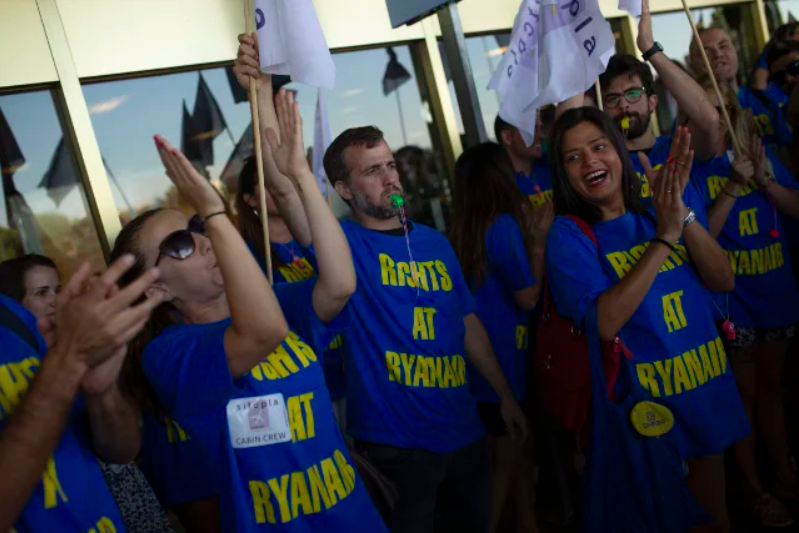Ireland: Ryanair Agrees to Negotiate New Employment Contracts with Unions

After a series of strike actions carried out by unionized employees of the second largest airline in Europe, Ryanair, the company said on October 22 that it would seek to reach an agreement with unions by Christmas. The company’s share value has declined by almost 40% from its peak last year before the dispute with its workers began.
The planes of the company are registered in Ireland and the 14,500 employees are hired from across Europe to work on bases in various countries. The workforce has been hired on the basis of Irish labor laws, which are among the most ‘liberal’ in the continent, allowing employers to hire and fire at ease, while making it difficult for the employees to challenge their layoffs legally.
Workers based in countries where the law provides for greater maternity benefits and welfare are unable to access these as their contracts are based on Irish labor laws. Unions have therefore been demanding that contracts be prepared as per the labour laws of the country in which the workers live.
In a major victory for the unions, the EU Commission on September 26 ordered Ryanair to comply with the EU rules, according to which the employees have to be hired in accordance with the labour laws of the countries where they live and work.
Dismissing this order as “irrelevant”, the company had said that it had already communicated to the unions in writing that it would be willing to shift the basis of workers’ contracts to local labour laws.
While the series of coordinated strikes by workers in multiple countries across Europe has thus won a major victory, the struggle to realize this promise made by their employees is still ongoing.
In Belgium, the company offered to shift the Ryanair contracts to the jurisdiction of local labour laws by March 2020. Both the Belgian union, the National Employees Center (CNE), which has been negotiating with the company, and the EU Commission have maintained that this delay is unjustifiable.
Further, this shift in 2020 will be applicable only for only those workers hired on Ryanair contracts. About 50% of the work force, which is hired on contracts with external recruitment agencies such as Crewlink and Workforce, will not see their contracts change even by 2020. Complaining that accepting such terms will divide the workers, on September 19, the
CNE, deeming these terms “unacceptable”, vowed to go ahead with the 24-hour strike on September 28, which CNE and another Belgian union called LBC, along with Italian unions UILTRASPORTI and FILT-CGIL, Spanish unions SITCPLA and USO, SNPVAC from Portugal and a Dutch union FNV had jointly declared after meeting in Rome on September 7.
On September 28, as workers went on a coordinated strike in five different countries, 150 of the Ryanair flights were grounded. The strike was called not only in demand of locals contracts, but also in protest against the company’s attempts to intimidate those workers who had participated in previous strikes by threatening them with firing or closing down entire bases.
The strike was the culmination of a long struggle. Although unions had been actively organizing the workers of this airline and representing them in disputes for many years now, Ryanair had refused to recognize them. It was only in December last year, under unceasing pressure imposed on the company, that the airline recognized them.
In the months of negotiations that followed, the company not only refused to shift the contracts to the local labour laws, but also maintained that everyone hired by Ryanair – either directly or by subcontracts through Crewlink and Workforce – must refer to Irish courts to bring any legal actions against the company. This denied the workers in countries with more labor-friendly laws the right to approach local and national forums for labour dispute settlement.
In mid-April, a number of unions across the continent “issued an ultimatum to the management of Ryanair, so that the company agrees to recognize the local legislation as do all airlines.” After the ultimatum ended in June, several unions met in July and decided on strike action.
On 20th and 24th of July, Ryanair workers in Dublin staged a walkout, leading to the cancellation of 30 flights. Quick to retaliate, Ryanair announced the next day that 100 pilots and 200 crew members in Dublin would be relocated to Poland, warning that those refusing to accept the relocation will be dismissed.
On that same day, employees in Spain, Portugal, Belgium and Italy struck work, bringing 600 of the company’s 2400 flights in Europe to a halt. By the month end, 96% of the members of Vereninging Nederlandse Verkeerscliegers (VNV), a union based in Netherlands, had voted in favor of strike action in August. Vereinigung Cockpit, a union in Germany (from where Ryanair had sought to fly in crew members to work in place of Belgian workers on strike in July) announced a 24-hour strike on August 10, after 96% of its members voted in support of industrial action.
With pilots from Ireland, Belgium, Sweden and Netherlands joining in, a total of 400 flights were grounded.
Read more on the August strike and on the positions taken by different trade unions here.
As Ryanair remained defiant, refusing to accept the demands of the workers, more industrial action was held across Europe, culminating in the 24-hour strike on September 28 by employees in five countries.
Two days before this strike, in a major victory to the striking workers, the European Commission ordered Ryanair to comply with the EU rules, which requires that the contracts be given to workers under the labour laws of the country where they stay and work. “Respecting the law is not something over which workers should have to negotiate and not something that can be postponed to a later date (a reference to the company’s proposal to the Belgian union that contracts can be shifted to local laws by 2020,” European Employment Commissioner Marianne Thyssen told Ryanair CEO Michael O’Leary at a meeting in Brussels.
Until the company complies with this, the unions have vowed to strike every month.
Get the latest reports & analysis with people's perspective on Protests, movements & deep analytical videos, discussions of the current affairs in your Telegram app. Subscribe to NewsClick's Telegram channel & get Real-Time updates on stories, as they get published on our website.
























